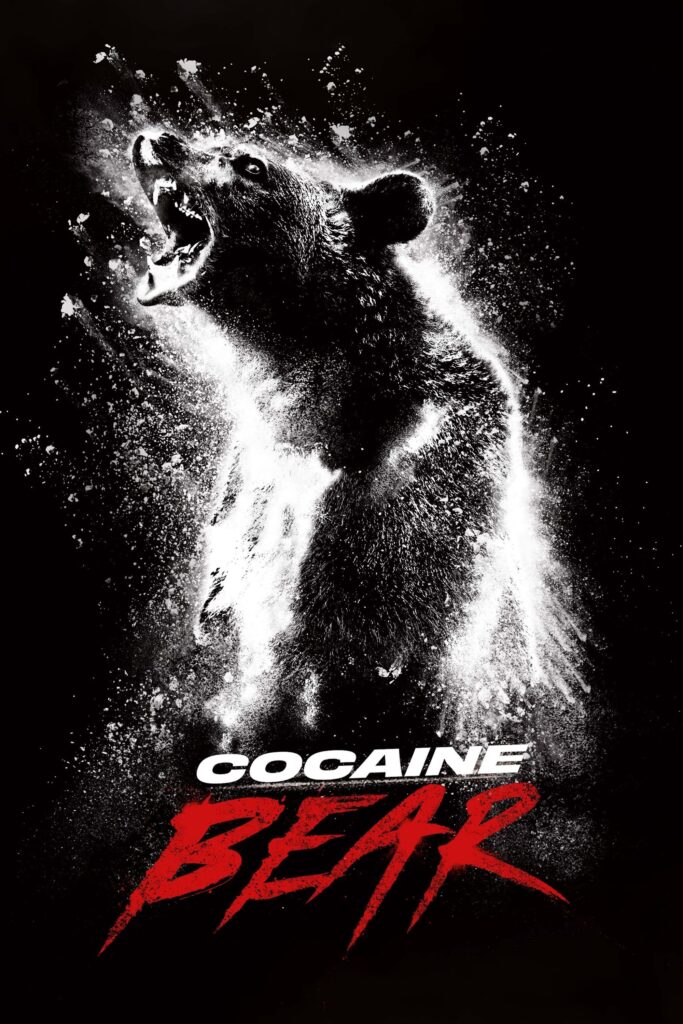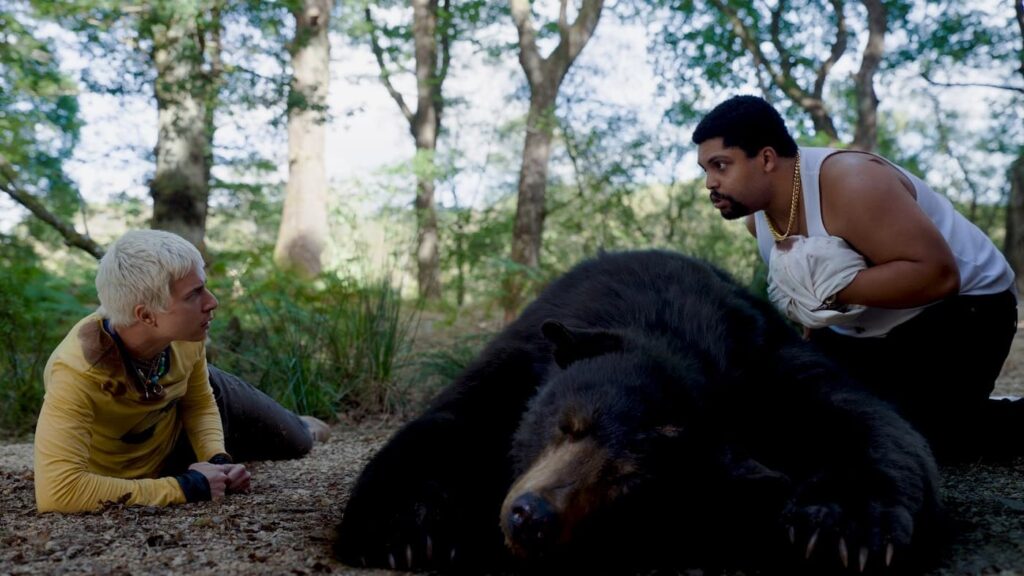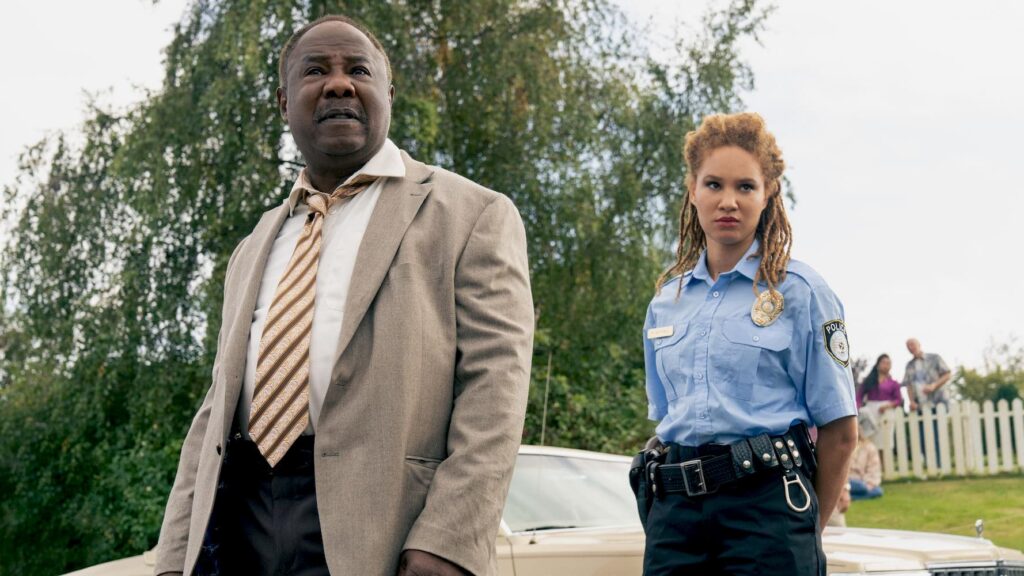Cocaine Bear, titled Crazy Bear in certain regions, is a 2023 American comedic horror film written and directed by Elizabeth Banks. The genuine account of the “Cocaine Bear,” an American black bear that consumed several kilos of a bag carrying around 75 lb (34 kg) of missing cocaine, served as a loose inspiration for the film. Keri Russell, O’Shea Jackson Jr., Christian Convery, Alden Ehrenreich, Brooklynn Prince, Margo Martindale, Jesse Tyler Ferguson, and Ray Liotta are among the actors who feature in the movie. It is in memory of Liotta, who passed away in May 2022. Netflix recently released this movie.

Prior to and following “Cocaine Bear,” there will be This is how our culture will measure time moving forward. That is the extent to which this film transforms.
Okay, so maybe it’s not all that deep. However, it is an amazing experience, particularly if you get to watch filmmaker Elizabeth Banks’ crazily violent comedy/thriller in front of a full house. Here, the shared experience is crucial. “Cocaine Bear” will unite individuals. “Cocaine Bear” is going to save movies.
That’s because “Cocaine Bear” is fully aware of its identity and its purpose. The bear is high on cocaine. It’s impossible to avoid drawing comparisons to the 2006 catastrophe spectacular “Snakes on a Plane” given its lofty concept and wild animal premise and the exuberant build-up that preceded it. Both films accomplish exactly what their titles imply, showing little effort to be deeper or more profound. The tempo falters the few moments “Cocaine Bear” tries to be romantic in the slightest. We are not here for this. We’re here to witness a bear go on a violent rampage across the forest after snorting a large amount of cocaine.
One of the many bizarre aspects of Banks’ picture is that it is based on a genuine story. Screenwriter Jimmy Warden has taken the fundamental facts—that is, that in 1985 a drug courier dropped some cocaine from an airplane into the stomach of a 175-pound black bear in Georgia—and imagined what would have occurred if the bear had not perished but instead had tried the substance and become hooked. Unfortunately for her, a colorful cast of hikers, rangers, crooks, and police officers happens to get in her way. When they happen to cross her way just when she needs her next fix, they particularly find themselves in danger. (And lest you think this is an anti-drug movie with a preachy, puritanical message, guess again; it incorporates a parody montage of classic 1980s “Just Say No” PSAs, including one from First Lady Nancy Reagan herself).
“Cocaine Bear” opens in the excess of the time, with an unidentifiable Matthew Rhys frantically filling duffel bags to the brim with powder (and sprinkling in a line here and there) with the plan to recover them later. (Hint: He didn’t.) However, because they are dispersed across Georgia’s Chattahoochee National Forest, a number of individuals go searching for them. They include their humorless boss (Ray Liotta in his farewell role, evoking one of his iconic performances from “Goodfellas”), a pair of mismatched buddy drug dealers (Alden Ehrenreich and O’Shea Jackson Jr.), and a police detective from the Kentucky town where the smuggler’s plane eventually crashed (Isiah Whitlock Jr., deadpan as always).

That day, there were other people meandering through the woods: a group of naughty teenagers; a determined single mother (Keri Russell) searching for her 13-year-old daughter (Brooklynn Prince) and her friend (Christian Convery), who had skipped school to visit the falls; a park ranger (a rambunctious Margo Martindale) and a wildlife specialist (Jesse Tyler Ferguson). (Both children are fantastic in a nostalgic sense, evoking the type of brazen, vulgar characters you’d see in films like “The Goonies” or “The Bad News Bears.” When the youngster finds one of these illicit packages, he says, “Let’s sell drugs together!” with joy rather than dread.
A large portion of the fun in “Cocaine Bear” stems from the creature’s appearance, which is remarkably sophisticated for such a corny, ridiculous film. Stuntman Allan Henry used motion capture to bring her to life, while Weta FX, the renowned New Zealand company, provided CGI. Although the motions have been noticeably accelerated and the animal has been anthropomorphized to an extreme, they still manage to create enough realism to make the bear’s assaults terrifying. Throughout, you’ll shriek and laugh, but you’ll also scream and writhe. The violence is frequently quite brutal and violent. Some of the most agonizing scenes aren’t caused by the bear per se; rather, they’re caused by all these foolish humans thinking of creative ways to hurt themselves.
You will probably find yourself cheering for the bear to triumph for that reason alone, among a plethora of other reasons. She is just ecstatic as she breaks through brick after brick and inhales a strong scent of the white substance. She frequently uses really creative methods to consume cocaine, such as doing a line off a leg she recently amputated. A particularly brilliant sequence of tempo and tone features the roving bear, the running ambulance, and the upbeat song “Just Can’t Get Enough” by Depeche Mode. Speaking of music, Mark Mothersbaugh’s score gives these shenanigans the ideal synth touch. Similarly, the production design, wardrobe, and needle drops that are appropriate for the era are spot-on without coming off as overt parodies.

It’s disappointing that the filmmakers took a break from the action to show us that these characters are real people since “Cocaine Bear” does what it does so effectively for so long. Certain notable supporting actors, like Aaron Holliday as the annoying adolescent and Scott Seiss as a paramedic, do change in unexpected ways. Even yet, “Cocaine Bear” ends on a very high note, even if the tension that drove the movie for the first two thirds of its fast running length wanes as it gets closer to its denouement.
Universal Pictures released Cocaine Bear in the United States on February 24, 2023. Despite having a $30–35 million production budget, the movie made over $90 million at the box office after receiving mostly favorable reviews from critics.




